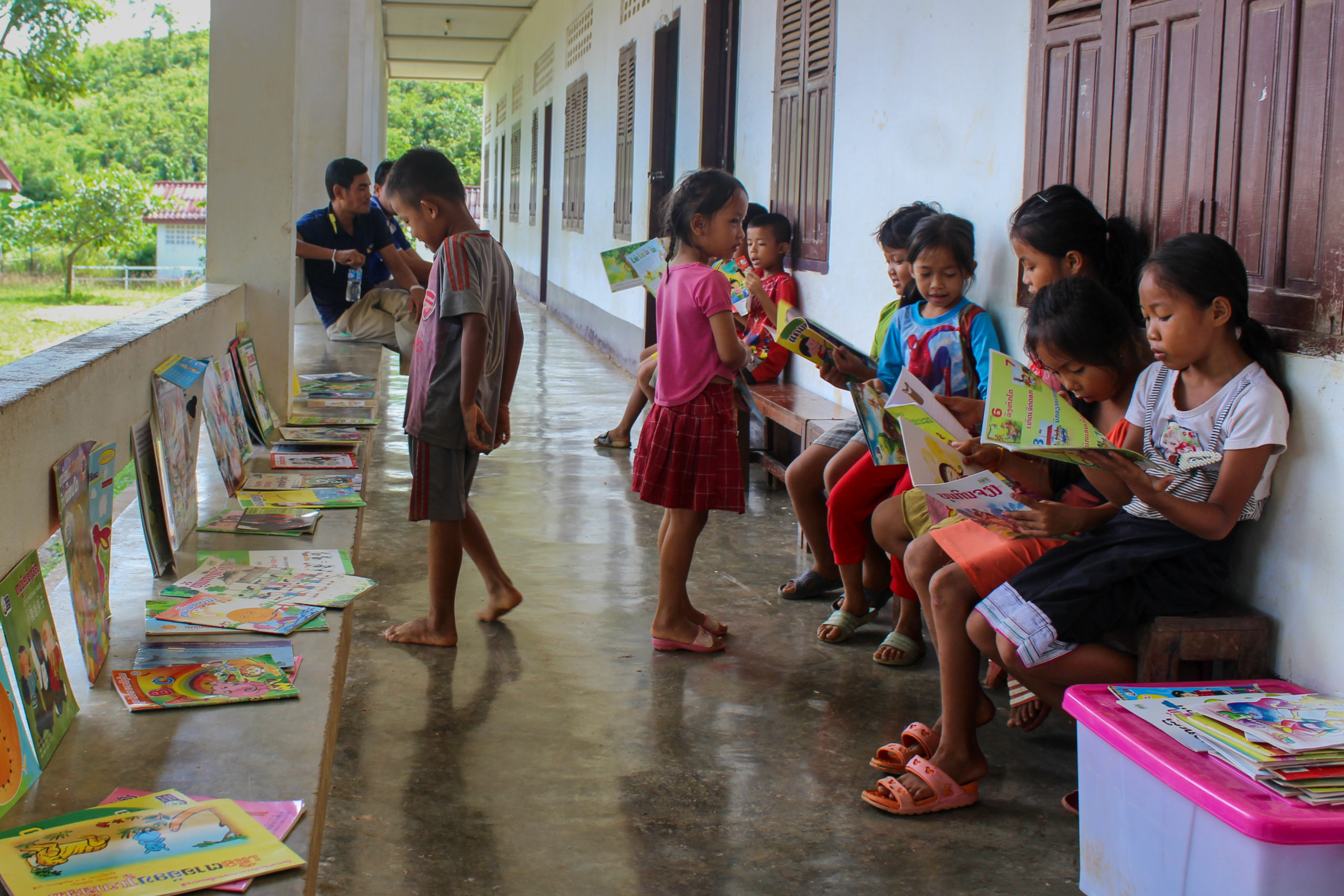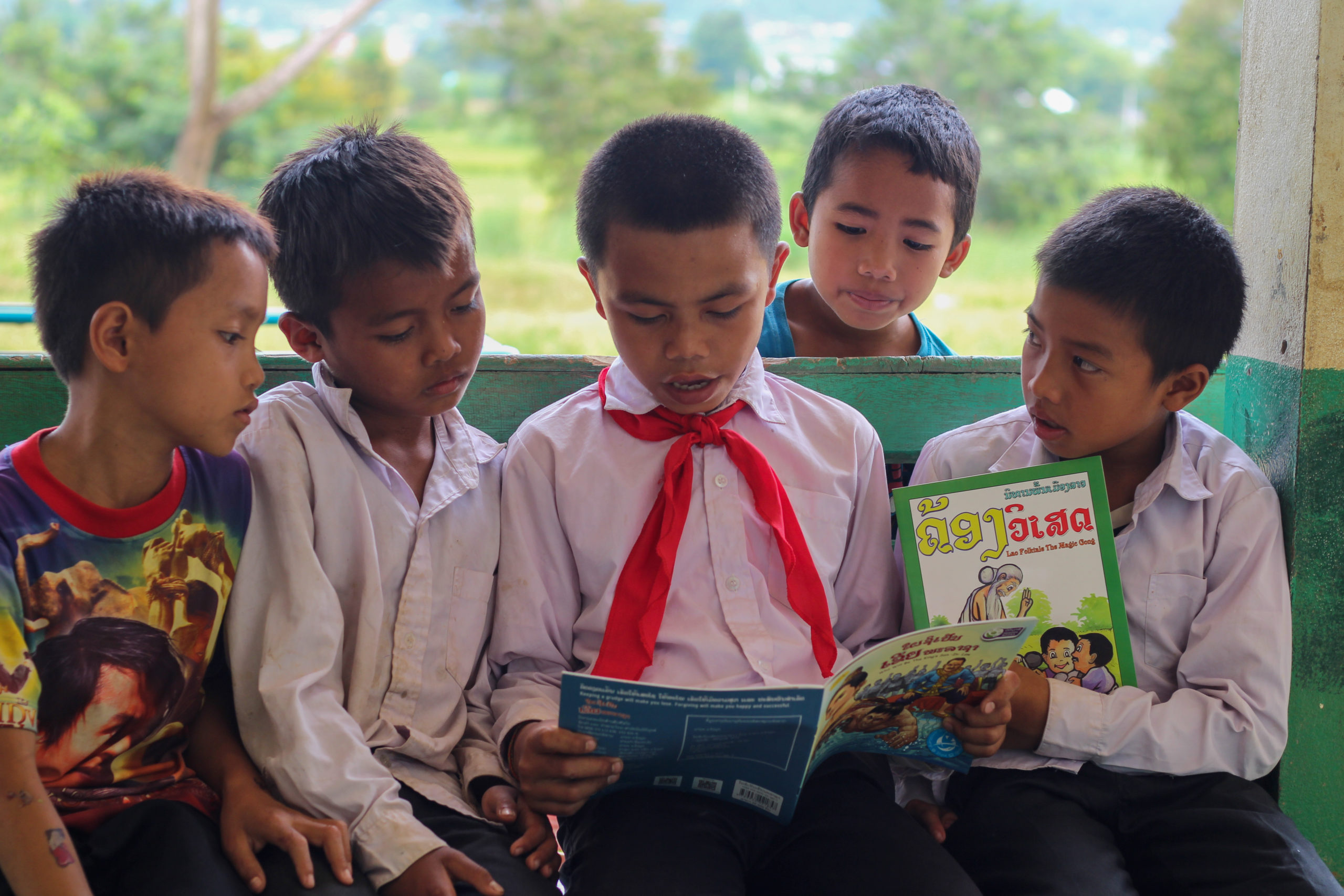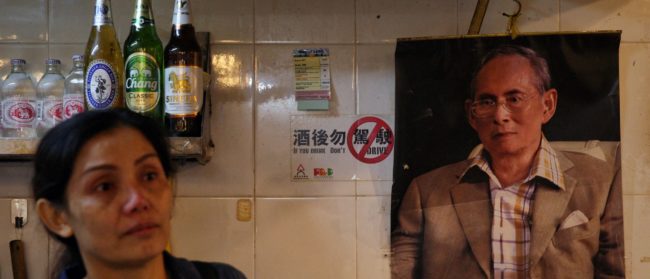Before a wave of Covid-19 infections swept Laos and shuttered its schools last month, 18-year-old volunteer PuYar would arrive at her remote village’s primary school to a sea of smiles from up to 200 young students calling her name.
Throwing a mat under the trees or the best bit of shade she could find, PuYar would bring the students outside, offer them books, read aloud or organise games, often quizzing the children on what they’d read. She started this work in September 2020 in her remote village of KonKaen when she joined international nonprofit Aide et Action’s mobile library project, carting in books and other learning resources to children who typically go without.
“I think this project is making the students love learning, helping them to read better and helping them to include new vocabulary in their sentences,” PuYar said. “Most of the children here struggle with reading so I hope what they’re learning right now through our educational games is going to improve their reading skills in the future.”
The subject of her hopeful optimism hit a snag not long after speaking with Globe. When the Covid-19 pandemic finally settled in Laos in mid-April, in-person schooling was put on pause, which also meant a temporary halt for the mobile library and other educational programmes.
Even before the outbreak affected in-person schooling, the Laotian education system had struggled to meet the basic needs of students. Research has long suggested many Laotian children and teachers alike struggle with basic verbal and mathematical literacy, with deficits contributing to a high drop-out rate among students.
By the time Covid-19 entered the picture, leaving children in rural, largely ethnic minority areas to rely on online education with only spotty internet access, the Laotian government had been in the midst of a multi-year rollout of a new curriculum for primary school students. This ambitious overhaul has been supported by initiatives such as the mobile library aimed at the most marginalised students.
Higher grade levels are set to return to school this week, and the government has announced a tentative reopening of schools and mobile libraries in early June. That timeline would hopefully minimise the impact on the youngest students and educational reforms. Some primary school teachers, such as Singhalad Mittaphab, fear any longer closure will boost Laos’ already high dropout rates.
“Students aren’t learning during lockdown because this time, the lockdown was urgent and teachers didn’t have lessons ready to assign to the students,” said Mittaphab, who works in the NamPhaet village of Vientiane province and is also a mobile library volunteer. “Farming families have to take their child to go to the field with them during school closures, so that is preventing the children from studying at home.”
Mittaphab is concerned that this risks children forgetting their learning and not wanting to return to school. As grade five classrooms and some in high school levels reopen on May 24 in selected parts of the country, Mittaphab and other volunteers will approach local authorities to request permission to resume mobile library activities in small groups.
“Most students really like mobile library activities and they’ve learned how to read and speak better,” she said. “But I’m afraid they’re forgetting what they learnt and I don’t want to see them give up on education.”

At the heart of the mobile library project is a “learning through play” method emphasising activities that promote exploration and hands-on learning, a list of activities that include singing, dancing, art, counting games and more. While each of these may be commonplace in other countries for children in grades one-four, such as those visited by PuYar, the Laotian education system has long relied on rote learning and memorisation, even for its youngest.
Prior to the latest outbreak, the mobile library project was supported by Aide et Action offering ethnic minority children from low-income households access to storybooks, educational toys and digital technologies such as tablets loaded with offline books and games.
Vithanya Noonan, Aide et Action Laos’ Country Manager, said the mobile libraries aren’t intended to just serve students directly, but also to show teachers new ways to educate.
“The project reached over 6,000 students in 2020 but equally as important are the teachers that are trained,” Noonan explained. “Almost 200 teachers of grades three-five were trained in child-friendly, student-centred methodologies and applied them in their classrooms, and we’ve seen three quarters of their students improve their learning outcomes.”
That’s why [Aide et Action mobile library] volunteers bring the books outside and organise games. The fun part is the game part
Currently, Aide et Action’s mobile libraries led by community volunteers are reaching 29 schools, 6,080 children from ethnic minority groups and 237 teachers across the provinces of Vientiane and Oudomxay.
While the primary focus is improving learning outcomes for children in grades one-four, the organisation is also collaborating with the government for the Education And Sports Sector Development Plan 2021-2025 to upskill teachers on more student-centred, child-friendly methodologies that utilise learn-through-play components.
As part of the plan, administrators will integrate these strategies into the new primary school curriculum developed through a 10-year educational programme led by the Lao government with support from the Australian Government and the European Union.
The new curriculum is currently being rolled out in stages, with first grade introduced in 2019, second grade in 2020 and third grade this year. Grades four and five will be established in 2022 and 2023, respectively, and all stages will allocate one textbook per student. Schools will receive additional educational materials, such as story books.
But while books are always welcome, Vithanya says that alone they are not enough to promote literacy, saying they usually “just sit on the shelves gathering dust”.
“That’s why [Aide et Action mobile library] volunteers bring the books outside and organise games. The fun part is the game part,” she said.
By encouraging curiosity through constructive play, research suggests children can improve both hard skills in language, literacy and math, as well as in social and emotional skills. Educational research has also found playful learning can teach leadership as well as group work skills that prepare young students for social integration.
“As long as the children are happy they’re more likely to participate and learn – especially children from ethnic minority groups who haven’t mastered the Lao language yet,” Vithanya added.

Though Laos has made important strides in increasing access to universal basic education – with preschool enrollment rates increasing from 39% to 59% between 2014-19, and net primary enrollment standing at 99% (grades one-five) in 2018-19 – learning outcomes remain weak.
Almost 20% of students enrolled in primary school won’t study further than fifth grade, according to research from the World Bank. Of those that progress to fourth grade, almost one quarter are unable to read three words of Lao correctly or add single-digit numbers correctly.
Outcomes are the lowest amongst children living in rural areas, from ethnic minority groups, and in the poorest quintile with the research revealing that Non-Lao Tai students scored almost 38 percentage points lower (49.5 vs 76.6%) in Lao language assessment and almost 13 percentage points lower in math assessments (16.5 vs 29.3%) compared to their Lao-Tai peers.
“Classroom teaching/learning that follows the state curriculum is generally limited to ‘school subjects’ taught in the Lao language,” explained Vithanya, accounting for the disparities. “It doesn’t work for all children and that’s why we’re using play to bridge gaps from an early age and include teachers in the solutions by focusing on broader physical, social, and emotional development and creativity.”
Similar issues apply to those standing at the front of the classroom. In 2018, another World Bank study found only 2.4% of fourth grade teachers were proficient in their grade’s levels of maths and Lao skills, meaning almost all would fail to score over 80% on an exam given to their students.
According to Vithanya, poor-quality teaching is having a knock-on effect not just on the academic development of children but also on their social and cognitive development.
“Children lack the confidence, knowledge and skills to integrate into society outside their immediate villages,” Vithanya explained. “A lack of understanding of Lao language among ethnic minority students leads them to find learning difficult and as a result they’re not confident in themselves and unlikely to pursue further education.”
Many of our new mobile library volunteers are teaching graduates, ready to learn play-based pedagogies that they weren’t taught in their training colleges. And the kids are ready to learn
While Lao’s current curriculum encourages teachers to dedicate 20% of class time to extracurricular activities or non-core subjects to allow for more holistic, student-centred learning, the country’s teachers often don’t know how to do that.
That’s where volunteers such as PuYar enter the story. Though she isn’t a teacher by profession, PuYar had recently completed her secondary level education when she decided to contribute to her community. She joined the mobile library project after watching last year’s Covid-19-related school closures, which she had feared would lead to children in her village dropping out of school.
Even in pre-pandemic Laos, access to online learning remained largely out of reach for local children and even story books were considered a luxury. By running the mobile library’s extracurricular activities, PuYar hoped she could support children’s development while fostering a love for reading that would see them eager to return to school despite closures.
“I love reading to them because I see them enjoy learning and now they ask for help,” she said, before the mobile library suspension due to the Covid-19 outbreak. “They ask what different words mean and I see them expand their vocabularies.”
For the most part, Noonan explained, PuYar’s enthusiasm was seen across the programme before its suspension.
“Many of our new mobile library volunteers are teaching graduates, ready to learn play-based pedagogies that they weren’t taught in their training colleges,” she said. “And the kids are ready to learn.”
This article has been written by Aide et Action as a part of a partnership with Southeast Asia Globe to highlight the need for equal access to education in the region. Find out more here.



